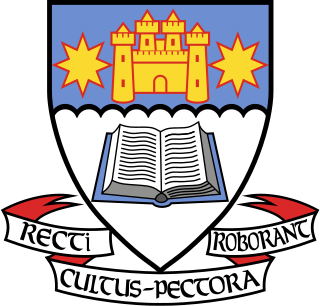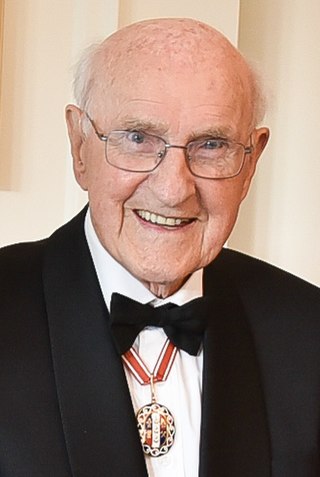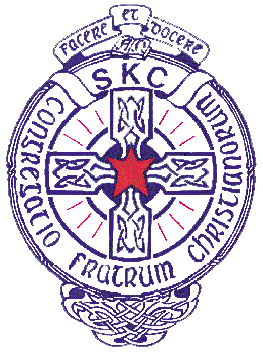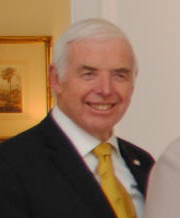
Dunedin is the second-largest city in the South Island of New Zealand, and the principal city of the Otago region. Its name comes from Dùn Èideann, the Scottish Gaelic name for Edinburgh, the capital of Scotland. The city has a rich Māori, Scottish, and Chinese heritage.

Otago Boys' High School (OBHS) is a secondary school in Dunedin, New Zealand. It is one of New Zealand's oldest boys' secondary schools. Originally known as Dunedin High School, it was founded on 3 August 1863 and moved to its present site in 1885. The main building was designed by Robert Lawson and is regarded as one of the finest Gothic revival structures in the country. Situated on high ground above central Dunedin it commands excellent views of the city and is a prominent landmark.

Sir Lloyd George Geering is a New Zealand theologian who faced charges of heresy in 1967 for teaching that the Bible's record of Jesus' death and resurrection is not true. He considers Christian and Muslim fundamentalism to be "social evils". Geering is emeritus professor of religious studies at Victoria University of Wellington. In 2007, he was appointed a Member of the Order of New Zealand, New Zealand's highest civilian honour, limited to 20 living people. Geering turned 100 in February 2018.
Southland Boys' High School (SBHS) is an all-boys school in Invercargill, New Zealand, and has been the only one in the city since Marist Brothers was merged with St Catherines to form Verdon College in 1982.

St Kevin's College in Oamaru, New Zealand, is a Catholic, coeducational, integrated, boarding and day, secondary school. It was founded by the Christian Brothers in 1927 for boys and became a co-educational school in 1983 after the Dominican Sisters closed down St Parick's College, Teschemakers, Oamaru. St Kevin's College became a state integrated school in 1983. The Christian Brothers ceased to be on the teaching staff of the college in the late 1990s but remained the school's proprietor, and so appointed representatives to the college board, until 2019 when they transferred the ownership of St Kevin's College to the Bishop of Dunedin.
Trinity Catholic College is a Catholic, state-integrated, co-educational, secondary school located in central Dunedin, New Zealand. The school was founded in 1989 as the successor of several other secondary schools the oldest of which was founded in 1871. Trinity is the only Catholic secondary school in Dunedin and is open to enrolments from throughout the entire city. The school's proprietor is the Catholic Bishop of Dunedin.

Thomas Burns was a prominent Scottish early European settler and religious leader of the province of Otago in New Zealand.
Andrew James Duncan Laing, generally known as Duncan Laing, was a New Zealand swimming coach based in Dunedin. He coached Olympian Danyon Loader, winner of two gold medals at the 1996 Atlanta Olympics and a silver medal at Barcelona in 1992, and Philip Rush, current world record holder for the fastest two and three way swim of the English Channel. He began teaching at Moana Pool in 1966, and over forty years training in Dunedin included 11 Olympic athletes. In 2003, Michael Phelps visited New Zealand to train under Laing. He had since retired from professional coaching, and received treatment in 2006 for melanoma on his leg and a brain tumour.

Thomas Kay Stuart Sidey was a former New Zealand politician who served as Mayor of Dunedin.
Thomas Henry Logan was a New Zealand water polo player, swimmer, surf lifesaver, dentist and naval officer.
Gordon Rowland Robert Hunter was a New Zealand rugby union player, coach and selector.
Helen Elisabeth Heslop is a physician-scientist from New Zealand whose clinical interests are in hematopoietic stem cell transplants. Heslop’s research focuses on immunotherapy to treat viral infections, post transplant and hematologic malignancies. She is a professor in the Department of Medicine and Pediatrics at Baylor College of Medicine and the director of the Center for Cell and Gene Therapy at Baylor College of Medicine, Texas Children’s Hospital and Houston Methodist Hospital. She is also the Dan L. Duncan Chair and the associate director of clinical research at the Dan L. Duncan Cancer Center.
Sio Tomkinson is a New Zealand rugby union player who currently plays as a centre for Dragons RFC in the United Rugby Championship. He has previously played for the Highlanders.
Wilfred Elles Bannerman was a New Zealand cricketer. He played in three first-class cricket matches for Otago between the 1911/12 and 1914/15 seasons.
Fletcher Smith is a New Zealand rugby union player who currently plays as a first five-eighth for Lyon in France’s league the Top 14. He has also represented the Highlanders. He is Māori of Ngāti Kahungunu descent.

Sir Eion Sinclair Edgar was a New Zealand businessman and philanthropist. He was the chairman of Forsyth Barr Group, a major investment company based in Dunedin, for 20 years until his retirement in 2018, and was chancellor of the University of Otago between 1999 and 2003.
Winifred Tweedie Lawrence was a New Zealand breaststroke swimmer, who, as Winnie Dunn, represented her country at the 1938 British Empire Games.
The following lists events that happened during 2018 in New Zealand.

Richie Graham Poulton was a New Zealand psychologist and the director of the University of Otago's Dunedin Multidisciplinary Health & Development Research Unit, which runs the Dunedin Multidisciplinary Health and Development Study. He was also a professor of psychology at the University of Otago, the 2007 founder and co-director of the National Centre for Lifecourse Research, the founder in 2011 of the Graduate Longitudinal Study, New Zealand, and the chief science adviser of the Ministry of Social Development in the New Zealand government.
Sir Scott Duncan Macfarlane is a New Zealand paediatric oncologist. Over his career, he was intimately involved in the development of a nationally coordinated approach to child cancer, which saw the survival rate for child cancer in New Zealand improve from 50 percent to better than 80 percent.








